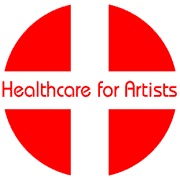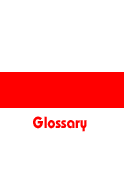






Glossary (*this page was updated 2/2/17)
KEY TERMS (in alphabetical order) Special thanks to Stu Sherman and to David A. Rice for help with this section.
Also please see the Connector's Glossary.
• Adjusted Gross Income: your total income from all sources minus any adjustments, i.e. specific deductions (including contributions to deductible retirement accounts, alimony paid by you); but not including standard and itemized deductions (on Federal Tax forms" 1040-find line 37; For Form 1040A-find line 21; For Form 1040EZ-find line 4; if you use other Federal Tax forms check with your accountant/tax preparitor to find the correct line for adjusted gross income).• Catastrophic Health Insurance: health plans that only cover "major medical" expenses, usually through high deductibles and low monthly premiums. These plans typically cover only major hospital and medical expenses above a certain deductible, while the insured pays out-of-pocket for everything else, such as routine doctor visits and prescription drugs.
• Consumer: in some health care literature people receiving medical care are referred to as consumers.
• Co-Pay: a flat dollar amount paid for a medical service by an insured person. Insurance companies use co-payments to share health care costs although the co-pay is often only a small portion of the actual cost of the medical service.
• Deductible: the portion of any medial claim that is not covered by the insurance provider. It is normally quoted as a fixed amount and is a part of most policies covering losses to the policy holder. The deductible must be "met", that is, paid by the insured, before the benefits of the policy can apply.
• Durable Medical Equipment: Medical equipment that is ordered by a doctor for use in treatment. DME's are covered separately from prescription drugs. Examples are walkers, wheelchairs, or insulin pumps.
• Employee HIRD form (Health Insurance Responsibility Disclosure): The form an employer with more than 11 Full time Equivalent Employees will have an employee fill out who declines to enroll in the employer's sponsored subsidized health plan (ie the employer is paying part of the premium cost) and/or that employee declines to participate in the employer's Section 125 Plan. When completing the HIRD form the employee must indicate whether they have an alternative source of health coverage.
• Employer Sponsored Insurance (ESI): The term used to denote the health insurance an employer offers their employees.
• Federal Poverty Line (FPL): The set minimum amount of income that a family needs for food, clothing, transportation, shelter and other necessities. FPL varies according to family size. The number is adjusted for inflation annually. Public assistance programs, such as Medicaid, define eligibility income limits as some percentage of FPL. These amounts are adjusted annually in April. (They are increased to keep pace with the standard of living)
• Gross Income: your total income from all sources (pre-taxes -i.e. before taxes are taken out- social security, Medicaid, etc.).
• HMO: type of Managed Care Organization (MCO) that provides a form of health insurance coverage fulfilled through hospitals, doctors, and other providers with which the HMO has a contract. Under this model, providers contract with an HMO to receive more patients and in return usually agree to provide services at a discount. This arrangement allows the HMO to charge a lower monthly premium. The providers and organizations that the HMO has a contract with are referred to as 'in their network."
• Health Safety Net (HSN): was formerly called the Uncompenstated Care Pool or the Free Care Pool. The HSN, like the Free Care pool was, is administered by the Division of Health Care Finance and Policy (DHCFP). This program helps to pay for some medical services for low and lower income people (with incomes up to 400 percent of the Federal Poverty Level (FPL) who sought care at a Hospital or a Community Health Center. Note there are new eligibilty requirements for the HSN. See our section on HSN.
• Individual Mandate: Beginning on July 1, 2007, Massachusetts residents age 18 and older are required to have health insurance that is deemed affordable to them at their income level or they risk being fiscally penalized on their income taxes. It is important to be aware that starting on January 1, 2009, individuals will have to have health insurance that is deemed affordable to them at their income level AND meets "Minimal Creditable Coverage" standards set by the Connector. The Department of Revenue (DOR) will be policing this part of the law. There is a waiver process from the individual mandate.
• Insured: those who have health insurance.
• Managed Care: an effort to control escalating health care costs by the health insurance industry, which defines a reasonable maximum fee that health care providers may charge for any given service. Providers are bound to accept these maximum fees if they wish to be listed in directories of specific insurance companies, which are provided to their policy holders as referral directories of "approved" physicians. (Administered primarily by private companies called "Managed Care Organizations").
• Medical Benefit Request (MBR): the form that is required to determine if an individual or family is eligible for a the Health Safety Net (HSN), a MassHealth Program, Commonwealth Care, or the Insurance Partnership.
• Modified Adjusted Gross Income (MAGI) is now the measure used to see if individuals are eligible for subsidies/tax credits to pay for their insurance. This is very helpful for those who are self-employed or have 1099 income. To learn what MAGI is: http://laborcenter.berkeley.edu/pdf/2013/MAGI_summary13.pdf
•Minimal Creditable Coverage (MCC) also referred to as creditable and affordable coverage or creditable coverage: The Connector set the standards that define what "creditable and affordable" health insurance coverage is. This is also referred to as minimum creditable coverage or MCC. Please see our section on MCC.
• Out of Pocket Medical Expenses: medical expenses that are not covered by insurance and paid for directly by the individual.
• Premium -a monthly amount paid by insured persons toward the costs of their coverage.
• PPO (preferred provider organization): insurance plans in which the policy-holder is free to choose his/her own physician, although they will generally receive greater benefits returns if they see a pre-approved "in-network" caregivers and facilities. These "network" caregivers and facilities are independent
of insurance company ownership, and may hold contracts for reimbursement with multiple insurers.• POS (Point of Service Plan): POs plans are almost a hybrid of HMO and PPO plans. Like an HMO, the individual designates an "in-network physician" to be their primary care provider. However, like a PPO, a POs plan lets the individual go "out-of-network". But when the individual goes out-of network, they will have to pay most of the cost, unless your primary care physician refers them to an out-of-network doctor. Then, the health plan will pick up the tab.
• Section 125 Cafeteria Plans an individual deposits funds into an account (usually the account is offered by their employer) to pay for their health insurance premiums. These accounts are tax exempt.
• Single Payer Health Care: a health care system in which a single entity, typically a government-run organization, acts as the administrator (or "payer") to collect all health care fees, and pay out all health care costs.
• Uncompensated Care Pool/ Free care pool: reimbursed hospitals and community health centers that provide care to eligible low-income uninsured and uninsured people. It was adminstered by the Division of Health Care Finance and Policy (DHCFP).Due to the health care reform law, it is now called the Health Safety Net and there are new eligibility requirments.
• Underinsured: an individual with health insurance that is inadequate to meet their health care needs.
• Uninsured: an individual with no health insurance-approximately 550,000 Massachusetts residents.
• Universal Health Care: a health care system in which all residents of a geographic or political entity have their health care paid for, regardless of medical condition or financial status.
• The Commonwealth Health Insurance Connector Authority (the Connector): The health care reform law created a new independent State agency, the Connector. This organization is charged with implementation of the law and for creating the policies, programs, and regulations to make the law a reality. The Connector is also charged with setting the standards that define what "credible and affordable" health insurance coverage is for the State.
• Department of Revenue (DOR): The Massachusetts Department of Revenue administers the tax laws of the Commonwealth of Massachusetts, oversees the Child Support Enforcement and The Division of Local Services that helps Massachusetts cities and towns achieve sound and efficient fiscal management through technical assistance, training and oversight. DOR will be enforcing the individual mandate of the Health care reform law via tax payers' income taxes and also will be enforcing that businesses abide by the regulations of the health care reform law.





